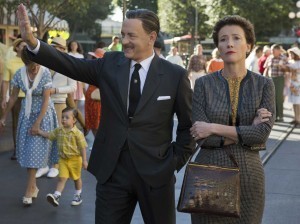Saving the Grownups

Anthony Lane’s review of Saving Mr. Banks reveals exactly how the film succeeds in captivating our attention:
“Sun came out to say hello to you!” Travers’s driver (Paul Giamatti) says, as she arrives in Los Angeles. “Don’t be preposterous,” she replies, and the movie is revived by that testiness and wit—the same qualities that rang through the fantastical briskness of the Poppins novels. Just as Mary rescued the wilting Banks family, so Thompson saves the film. A spoonful of her medicine makes the sugar go down
http://www.newyorker.com/arts/critics/ci…
Beyond the collision of acerbic wit with a sunny disposition, there are powerful competing arguments in the film about what is “for your own good” when it comes to entertainments for children. ”Where is the gravitas?” Travers asks a befuddled Walt Disney, who is committed to spiritual uplift with jaunty dialogue and upbeat tunes. After all, Mary Poppins, as the screenwriters imagine the book, was born of an adult’s need to work through childhood trauma. Walt and Pamela both suffered as children, with Walt bending to the will of an exploitative father who insists that his sons help out in the family business by delivering newspapers, no matter how cold it is or how long it takes, and Pamela witnessing an alcoholic father’s painful descent into dysfunction, illness, and death.
As adults, the two take different approaches to producing entertainments for children, and their views mirror the bifurcation of opinions in the field of children’s literature, with protectionists on one side and the “anything goes” folks on the other. Real life is fairly miserable, Rousseau lectured parents, and you might as well indulge the young. “Love childhood,” he wrote in his educational tract Emile, “promote its games, its pleasures, its amiable instinct.” That’s just what Walt Disney would say. Travers, by contrast, takes the view that we should not sugarcoat, that we should not play “let’s pretend” and instead teach children about the harsh realities of life. Mary Poppins does not exactly belong to the “hard facts” school of children’s literature, and Disney entertainments, as we know from all those crafty wicked figures dressed in purple and black (with a touch of gold), give us more than spoonfuls of sugar. But Saving Mr. Banks offers a great little tutorial on the high stakes in the game of writing for children, and it reminds us, in its title, as elsewhere in the film, that the redemption of adults might be the real holy grail sought by authors of children’s books.
Maria Tatar's Blog
- Maria Tatar's profile
- 316 followers



